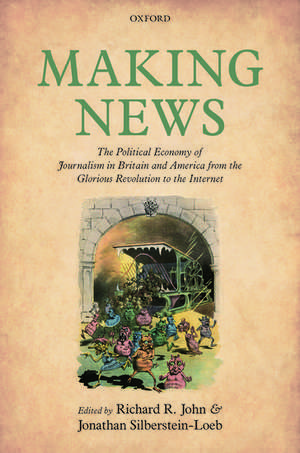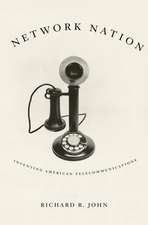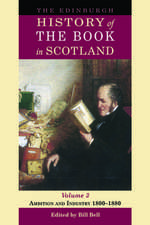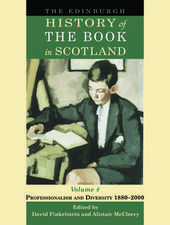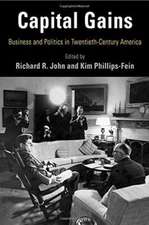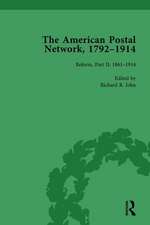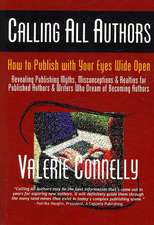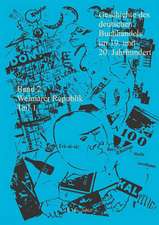Making News: The Political Economy of Journalism in Britain and America from the Glorious Revolution to the Internet
Editat de Richard R. John, Jonathan Silberstein-Loeben Limba Engleză Hardback – 23 sep 2015
| Toate formatele și edițiile | Preț | Express |
|---|---|---|
| Paperback (1) | 220.59 lei 31-37 zile | |
| OUP OXFORD – 30 mai 2018 | 220.59 lei 31-37 zile | |
| Hardback (1) | 628.99 lei 31-37 zile | |
| OUP OXFORD – 23 sep 2015 | 628.99 lei 31-37 zile |
Preț: 628.99 lei
Preț vechi: 859.36 lei
-27% Nou
Puncte Express: 943
Preț estimativ în valută:
120.35€ • 125.100$ • 99.59£
120.35€ • 125.100$ • 99.59£
Carte tipărită la comandă
Livrare economică 27 martie-02 aprilie
Preluare comenzi: 021 569.72.76
Specificații
ISBN-13: 9780199676187
ISBN-10: 0199676186
Pagini: 274
Dimensiuni: 167 x 241 x 21 mm
Greutate: 0.6 kg
Editura: OUP OXFORD
Colecția OUP Oxford
Locul publicării:Oxford, United Kingdom
ISBN-10: 0199676186
Pagini: 274
Dimensiuni: 167 x 241 x 21 mm
Greutate: 0.6 kg
Editura: OUP OXFORD
Colecția OUP Oxford
Locul publicării:Oxford, United Kingdom
Recenzii
This absolutely essential book combines meticulous, original research from leading authorities with a finely tuned editorial sensibility to reinforce the centrality to journalism of the political economy.
Making News provides a necessary and much needed historical perspective on the development of news journalism in the US and the UK since 1688.Covering two countries and three centuries in a tightly edited volume, the contributors convincingly show how economic, political, and normative institutional arrangements are at least as important as media technologies in shaping the production and dissemination of news, confronting hyperbolic techno-jargon (whether Victorian or contemporary) with sober historical analysis.
Making News offers a startling multi-century tour from the birth of newspapers to the rise of the Internet. There are surprises on almost every page. The value of this rigorous, crisply written book is enhanced because the authors dont just record the history of news. They place the enfolding chronology in historical context, making their narrative come alive, gently instructing readers on not just what happened but why.
Do not mistake this book for yet another sentimental look at the history of a dying medium. From the eighteenth century to the present, this rich transatlantic collection challenges us to turn away from the dazzle of new media technologies and to explore the political and economic institutions that have always shaped the news. Rigorously researched and analytically acute, the essays gathered here serve as thoughtful, probing guides not only to the journalism of the past, but to the forces that will shape the news media of the future.
This book breaks new ground by focusing on the economic, technological, and public policy influences that shaped British and American journalism over three centuries. It is full of new insights and new information that will require the history of journalism to be reinterpreted.
A meticulous, thought-provoking, and accessible work which offers an original and engaging insight for anyone interested in the history of Anglo-American journalism and its business, economic, and technological developments.
The work's underlying thesis, played out across the volume's eight chapters, is that the free-market approach favored by contemporary Internet-focused journalistsas well as by many of today's media business savantswill ultimately prove incapable of producing the kind of reliable, high-quality reporting serious news organizations were expected to deliver prior to the technological revolution of the late-twentieth-century arrival of the Internet. At its core, the central argument of this book is persuasive, all the more so because earlier revolutions in the business of news are explored deeply for the purpose of comparison, contrast, and agency.
Overall, this collection offers interesting interpretations of how political and economic institutions jointly altered the number and nature of players in the newspaper field.This collection will be a useful introduction to this vital and vibrant industry for scholars of organizations and the economy who are analyzing its recent past and its future.
The book belongs in graduate colloquia in journalism history. It would be especially beneficial for graduate students to force them to think outside the traditional mass communications box.
In its geographic and chronological breadth, there is simply nothing else like Making News. Few works have managed to walk the tightrope of journalism historythat is, simultaneously accounting for the news's place in deliberative democracy and its place in the structures of modern capitalismwith such skill. In fact, many of the authors most adept at doing so in the past are represented here. As such, Making News will be of great service not only to scholars in specialized fields such as media history and journalism studies, but to historians broadly interested in the complex interplay of economic institutions and democratic society.
Media history, business history and journalism studies scholars alike will enjoy these themed essays and their authors perspectives on where our journalism-driven political economy comes from, and where it may be going.
Making News provides a necessary and much needed historical perspective on the development of news journalism in the US and the UK since 1688.Covering two countries and three centuries in a tightly edited volume, the contributors convincingly show how economic, political, and normative institutional arrangements are at least as important as media technologies in shaping the production and dissemination of news, confronting hyperbolic techno-jargon (whether Victorian or contemporary) with sober historical analysis.
Making News offers a startling multi-century tour from the birth of newspapers to the rise of the Internet. There are surprises on almost every page. The value of this rigorous, crisply written book is enhanced because the authors dont just record the history of news. They place the enfolding chronology in historical context, making their narrative come alive, gently instructing readers on not just what happened but why.
Do not mistake this book for yet another sentimental look at the history of a dying medium. From the eighteenth century to the present, this rich transatlantic collection challenges us to turn away from the dazzle of new media technologies and to explore the political and economic institutions that have always shaped the news. Rigorously researched and analytically acute, the essays gathered here serve as thoughtful, probing guides not only to the journalism of the past, but to the forces that will shape the news media of the future.
This book breaks new ground by focusing on the economic, technological, and public policy influences that shaped British and American journalism over three centuries. It is full of new insights and new information that will require the history of journalism to be reinterpreted.
A meticulous, thought-provoking, and accessible work which offers an original and engaging insight for anyone interested in the history of Anglo-American journalism and its business, economic, and technological developments.
The work's underlying thesis, played out across the volume's eight chapters, is that the free-market approach favored by contemporary Internet-focused journalistsas well as by many of today's media business savantswill ultimately prove incapable of producing the kind of reliable, high-quality reporting serious news organizations were expected to deliver prior to the technological revolution of the late-twentieth-century arrival of the Internet. At its core, the central argument of this book is persuasive, all the more so because earlier revolutions in the business of news are explored deeply for the purpose of comparison, contrast, and agency.
Overall, this collection offers interesting interpretations of how political and economic institutions jointly altered the number and nature of players in the newspaper field.This collection will be a useful introduction to this vital and vibrant industry for scholars of organizations and the economy who are analyzing its recent past and its future.
The book belongs in graduate colloquia in journalism history. It would be especially beneficial for graduate students to force them to think outside the traditional mass communications box.
In its geographic and chronological breadth, there is simply nothing else like Making News. Few works have managed to walk the tightrope of journalism historythat is, simultaneously accounting for the news's place in deliberative democracy and its place in the structures of modern capitalismwith such skill. In fact, many of the authors most adept at doing so in the past are represented here. As such, Making News will be of great service not only to scholars in specialized fields such as media history and journalism studies, but to historians broadly interested in the complex interplay of economic institutions and democratic society.
Media history, business history and journalism studies scholars alike will enjoy these themed essays and their authors perspectives on where our journalism-driven political economy comes from, and where it may be going.
Notă biografică
Richard R. John is a Professor of History and Communications at Columbia Journalism School, Columbia University. He is a historian who specializes in the history of business, technology, communications, and American political development. He teaches and advises graduate students in Columbia's Ph.D. program in communications, and is member of the core faculty of the Columbia history department, where he teaches courses on the history of capitalism and the history of communications.Jonathan Silberstein-Loeb was Senior Lecturer in History at Keble College, Oxford. He is now a barrister of the Inner Temple.
